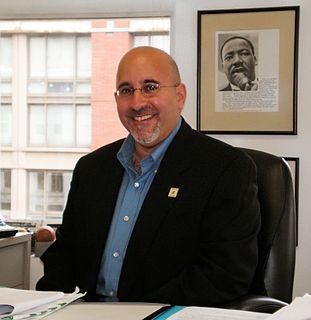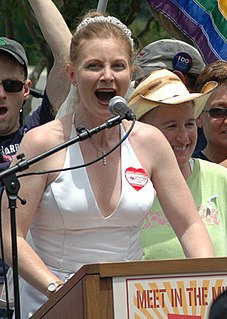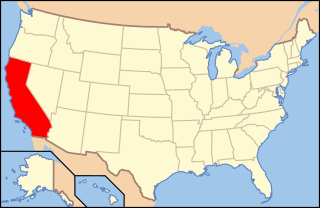Related Research Articles

Dorothy Louise Taliaferro "Del" Martin and Phyllis Ann Lyon were an American lesbian couple known as feminist and gay-rights activists.
This is a list of notable events in the history of LGBT rights that took place in the year 2004.

Freedom to Marry was the national bipartisan organization dedicated to winning marriage for same-sex couples in the United States. Freedom to Marry was founded in New York City in 2003 by Evan Wolfson. Wolfson served as president of the organization through the June 2015 victory at the Supreme Court, until the organization's official closing in February 2016.
Same-sex marriage is legal in the U.S. state of California. The state first issued marriage licenses to same-sex couples June 16, 2008 as a result of the Supreme Court of California finding in In re Marriage Cases that barring same-sex couples from marriage violated the state's Constitution. The issuance of such licenses was halted from November 5, 2008 through June 27, 2013 due to the passage of Proposition 8—a state constitutional amendment barring same-sex marriages. The granting of same-sex marriages recommenced following the United States Supreme Court decision in Hollingsworth v. Perry, which restored the effect of a federal district court ruling that overturned Proposition 8 as unconstitutional.

Evan Wolfson is an attorney and gay rights advocate. He is the founder of Freedom to Marry, a group favoring same-sex marriage in the United States, serving as president until its 2015 victory and subsequent wind-down. Wolfson authored the book Why Marriage Matters: America, Equality, and Gay People's Right to Marry, which Time Out New York magazine called, "Perhaps the most important gay-marriage primer ever written". He was listed as one of Time magazine's 100 most influential people in the world. He has taught as an adjunct professor at Columbia Law School, Rutgers Law School, and Whittier Law School and argued before the Supreme Court in Boy Scouts of America v. Dale. He now teaches law and social change at Georgetown Law School and at Yale University; serves as a senior counsel at Dentons, the world's largest law firm; and primarily provides advice and assistance to other organizations and causes, in the United States and globally, that are seeking to adapt the lessons on "how to win" from the same-sex marriage movement.
The San Francisco 2004 same-sex weddings took place between February 12 and March 11, 2004, after San Francisco Mayor Gavin Newsom directed the city-county clerk to issue marriage licenses to same-sex couples. California Attorney General Bill Lockyer and a number of interest groups sued to end the practice. About 4,000 such licenses were issued before the California Supreme Court ordered a halt to the practice on March 11. On August 12, 2004, the California Supreme Court voided all of the licenses that had been issued in February and March.

Molly B. McKay is an American attorney and a civil rights activist for lesbian, gay, bisexual and transgender individuals. McKay was the former Co-Executive Director of Marriage Equality California and the former Media Director for Marriage Equality USA. She has also been active in Californians for Same Sex Marriage and the California Freedom to Marry Coalition, and was the Associate Executive Director of Equality California. McKay married her longtime partner Davina Kotulski in 2004 when Gavin Newsom made same sex marriage legal for one day in San Francisco.
Same-sex marriage in Iowa has been legally recognized since a decision of the Iowa Supreme Court on April 3, 2009. Marriage licenses became available to same-sex couples on April 27.
Diane A. Sabin is a lesbian feminist activist in the San Francisco Bay Area. Her early work was in production of lesbian musical performers as well as the San Francisco Pride stages. She founded Sabin Chiropractic, a successful community clinic in the Castro. She does activist work to improve the health of lesbians and the LGBT community through representation in the larger health care institutions and research.
Same-sex marriage has been legally recognized in the U.S. state of Illinois since a law signed by Governor Pat Quinn on November 20, 2013 took effect on June 1, 2014. Same-sex marriage legislation was introduced in successive sessions of the General Assembly from 2007 to 2013. It passed the Senate in February 2013, but legislators delayed a vote in the House while lobbying for votes until November 5, 2013, when the House passed an amended version of the bill by a narrow margin. The Senate quickly approved the amended bill and Governor Quinn signed it into law on November 20. The law went into effect (statewide) on June 1, 2014, with same-sex couples able to apply for marriage licenses and then marry after the mandatory one-day waiting period.
Same-sex marriage became legally recognized statewide in the U.S. state of New Mexico through a ruling by the New Mexico Supreme Court on December 19, 2013, requiring all county clerks to issue marriage licenses to qualified couples seeking marriage regardless of gender. Until then, same-sex couples could only obtain marriage licenses in certain counties of the state. Eight of the 33 counties, covering 58% of the state's population, had begun issuing marriage licenses to same-sex couples in August and September 2013. New Mexico's marriage statute is not specific as to gender. It is the only state lacking a state statute or constitutional provision explicitly addressing same-sex marriage. Lacking a state law or judicial ruling concerning same-sex marriage prior to December 19, 2013, policy for the issuance of marriage licenses to same-sex couples was determined at the county level at the discretion of local issuing authorities i.e., some counties recognized same-sex marriage and issued marriage licenses to same-sex couples, while others did not. Despite the ruling by the New Mexico Supreme Court allowing same-sex marriages in the state, some of New Mexico's Native American tribes continue to prohibit same-sex marriages within their jurisdictions and do not recognize same-sex marriages performed elsewhere. The San Ildefonso Pueblo's tribal code recognizes state law to a degree, but its tribal marriage certificates require licenses be issues to an unmarried male and unmarried female.
In re Marriage Cases, 43 Cal. 4th 757 was a California Supreme Court case where the court held that laws treating classes of persons differently based on sexual orientation should be subject to strict judicial scrutiny, and that an existing statute and initiative measure limiting marriage to opposite-sex couples violate the rights of same-sex couples under the California Constitution and may not be used to preclude them from marrying.

Proposition 8, known informally as Prop 8, was a California ballot proposition and a state constitutional amendment intended to ban same-sex marriage; it passed in the November 2008 California state elections and was later overturned in court. The proposition was created by opponents of same-sex marriage in advance of the California Supreme Court's May 2008 appeal ruling, In re Marriage Cases, which followed the short-lived 2004 same-sex weddings controversy and found the previous ban on same-sex marriage unconstitutional. Proposition 8 was ultimately ruled unconstitutional by a federal court in 2010, although the court decision did not go into effect until June 26, 2013, following the conclusion of proponents' appeals.
The mayoralty of Gavin Newsom began when Democrat Gavin Newsom was elected Mayor of San Francisco in 2003, succeeding Willie Brown and becoming San Francisco's youngest mayor in a century.
Hollingsworth v. Perry was a series of United States federal court cases that re-legalized same-sex marriage in the state of California. The case began in 2009 in the U.S. District Court for the Northern District of California, which found that banning same-sex marriage violates equal protection under the law. This decision overturned ballot initiative Proposition 8, which had banned same-sex marriage. After the State of California refused to defend Proposition 8, the official sponsors of Proposition 8 intervened and appealed to the Supreme Court. The case was litigated during the governorships of both Arnold Schwarzenegger and Jerry Brown, and was thus known as Perry v. Schwarzenegger and Perry v. Brown, respectively. As Hollingsworth v. Perry, it eventually reached the United States Supreme Court, which held that, in line with prior precedent, the official sponsors of a ballot initiative measure did not have Article III standing to appeal an adverse federal court ruling when the state refused to do so.

California is seen as one of the most liberal states in the U.S. in regard to lesbian, gay, bisexual, transgender (LGBT) rights, which have received nationwide recognition since the 1970s. Same-sex sexual activity has been legal in the state since 1976. Discrimination protections regarding sexual orientation and gender identity or expression were adopted statewide in 2003. Transgender people are also permitted to change their legal gender on official documents without any medical interventions, and mental health providers are prohibited from engaging in conversion therapy on minors.
Same-sex marriage in the U.S. state of Kentucky is legal under the U.S. Supreme Court ruling in Obergefell v. Hodges. The decision, which struck down Kentucky's statutory and constitutional bans on same-sex marriages, was handed down on June 26, 2015, and Governor Steve Beshear and Attorney General Jack Conway announced almost immediately that the court's order would be implemented.
The history of same-sex marriage in the United States dates from the early 1970s, when the first lawsuits seeking legal recognition of same-sex relationships brought the question of civil marriage rights and benefits for same-sex couples to public attention though they proved unsuccessful. However marriage wasn't a request for the LGBTQ movement until the Second National March on Washington for Lesbian and Gay Rights in Washington (1987). The subject became increasingly prominent in U.S. politics following the 1993 Hawaii Supreme Court decision in Baehr v. Miike that suggested the possibility that the state's prohibition might be unconstitutional. That decision was met by actions at both the federal and state level to restrict marriage to male-female couples, notably the enactment at the federal level of the Defense of Marriage Act.
Kimberly Jean Davis is a former county clerk for Rowan County, Kentucky, who gained international attention in August 2015 when she defied a U.S. federal court order to issue marriage licenses to same-sex couples. She was defeated by Democratic challenger Elwood Caudill Jr. in the November 6, 2018, election and vacated the office on January 7, 2019.
References
- ↑ "No organized celebration for National Freedom to Marry Day". www.thedp.com. Retrieved 2016-05-03.
- ↑ Cass, Maxine (2006-01-01). It Happened in San Francisco. Globe Pequot. ISBN 9780762738236.
- ↑ "National Freedom to Marry Day -- February 12". Lambda Legal. Retrieved 2020-02-18.